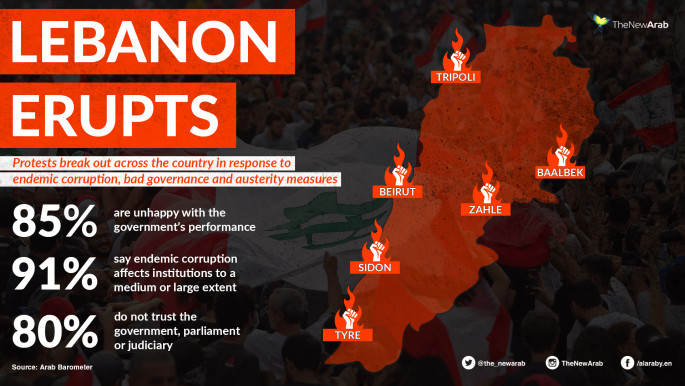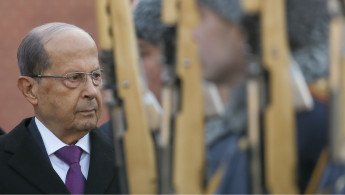Lebanese president says corruption charges 'not fair' in first comments on mass protests
"What is happening in the streets expresses people's pain, but generalising corruption (charges) against everyone carries big injustice," Aoun said during a cabinet session.
Aoun added that the government must at least start by lifting banking secrecy from current and future ministers, his office said in a tweet.
His comments came as the Lebanese cabinet met at the presidential palace to discuss a reform plan put together by Prime Minister Saad Hariri in a bid to tackle the crisis that has driven hundreds of thousands of protesters to the streets.
Hariri's blueprint contains a series of reforms, which includes a 50 percent slash to the salaries of state officials, including the president, ministers and MPs.
The draft plan also includes a reduction in benefits for state institutions and officials, in hope to calm the protests which have been the biggest show of dissent against the ruling elite in decades.
Lebanon's debt-burdened economy has been sliding towards collapse in recent months, adding to the economic woes of a population exasperated by rampant corruption, the lack of job opportunities and poor services.
More than a quarter of Lebanon's population lives below the poverty line, the World Bank says, while the political class has remained relatively unchanged since the end of a devastating 15-year civil war in 1990.
Lebanon ranked 138 out of 180 in Transparency International's 2018 corruption index, and residents suffer chronic electricity and water shortages.
Follow us on Twitter: @The_NewArab





 Follow the Middle East's top stories in English at The New Arab on Google News
Follow the Middle East's top stories in English at The New Arab on Google News
![Netanyahu furiously denounced the ICC [Getty]](/sites/default/files/styles/image_330x185/public/2024-11/GettyImages-2169352575.jpg?h=199d8c1f&itok=-vRiruf5)
![Both Hamas and the Palestinian Authority welcomed the ICC arrest warrants [Getty]](/sites/default/files/styles/image_330x185/public/2024-11/GettyImages-2178351173.jpg?h=199d8c1f&itok=TV858iVg)
